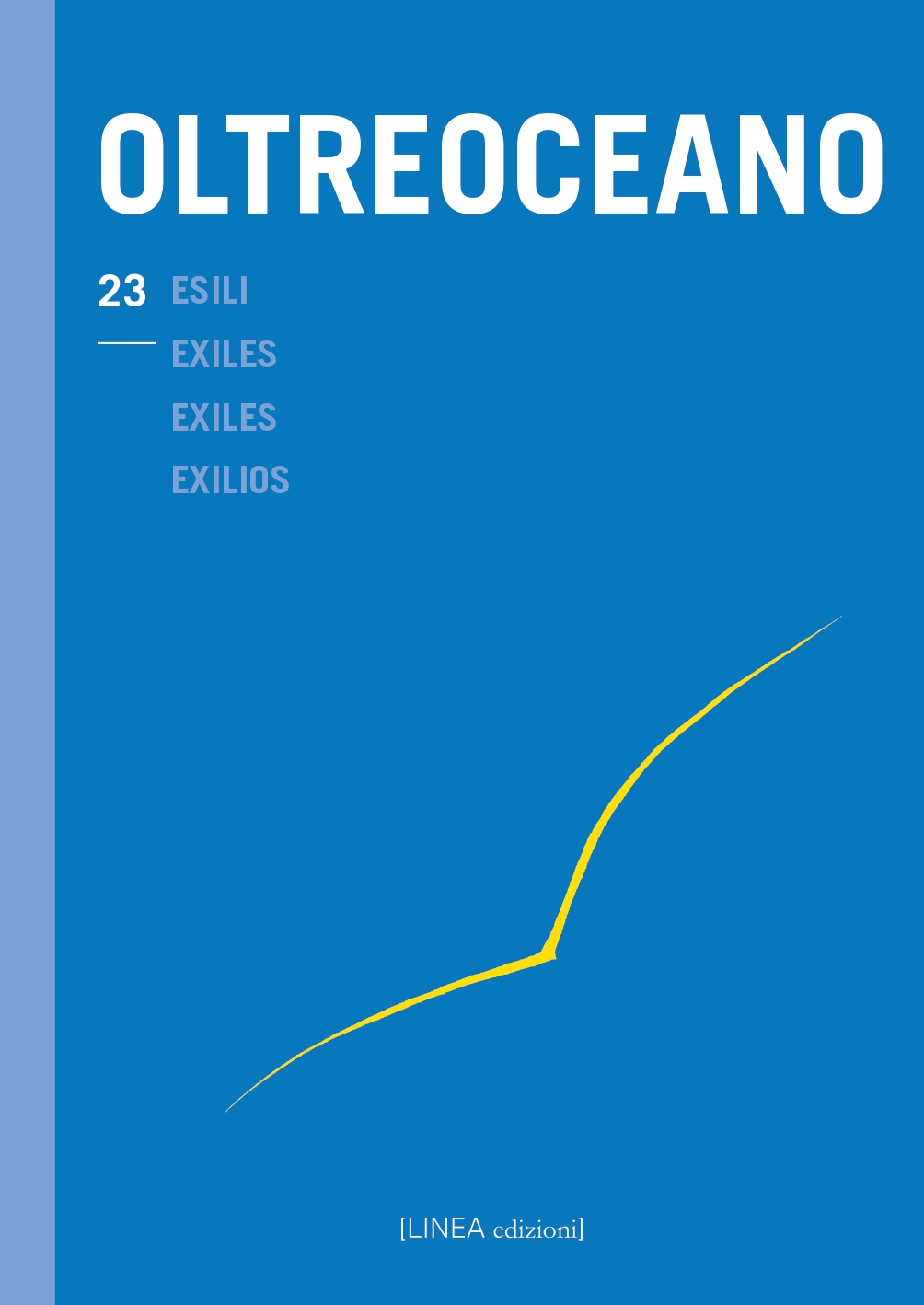“Dépaysé”: the linguistic exile of “italic” writers. Antonio D’Alfonso converses with Alessandra Ferraro
DOI:
https://doi.org/10.53154/Oltreoceano102Keywords:
Exile, Italic Culture, Antocio D'Alfonso, Italian-Canadian WritingAbstract
In 1978, Antonio D’Alfonso founded the publishing house Guernica in Montreal, which published in three languages; with Filippo Salvatore and Fulvio Caccia, he then participated in the birth of Italian-Canadian literature and, with works in English and French, he became a major figure in this artistic movement. In 2021, he inaugurated a more intimate, autobiographical vein (Outside Looking In, Dépaysé) and published an essay, notably “Federazione per il futuro”, where he explores the evolution of the “italic”culture produced in the context of Italian emigration. The conversation is about this culture of which the Italian-Canadian intellectual is the spokesman. Ferraro’s exchanges with D’Alfonso, born within the activities organized by the Centro di Cultura Canadese in Udine, enriched over the years by correspondence and meetings in Montreal, have made it possible to deepen and define the key aspects of his thought and work. His condition as an exile, from a geographical, cultural and linguistic point of view, pushed Antonio D’Alfonso to reflect on his composite identity, to create multilingual and transmedial works and to forge the notion of “italics” to bring out, by trying to define it, the invisible production of Italian writers abroad, children of this emigration that emptied Italy for decades. The loss of their country and their culture of origin intimately marked the emigrants and their children, giving the works born in this context characteristics that derive from this deterritorialization.
Downloads
References
Andrews B. & Bernstein Charles (2020): L=A=N=G=U=A=G=E. The Complete Facsimile. M. Hofer & M. Golston (Eds). Albuquerque (NM): University of New Mexico Press (Recencies Series: Research and Recovery in Twentieth-Century American Poetics).
Beck, U. (2006): Qu’est-ce que le cosmopolitisme? Aurélie Duthoo (Trad.). Paris: Aubier.
Calvino, I. (1965, gennaio): L’italiano, una lingua tra le altre. Rinascita, XXII, 5 (supplemento mensile Il Contemporaneo, 1), pp. 5-6.
Cohen, L. (1992): Anthem. Chanson. In The Future. Album.
D’Alfonso, A. (1973): La chanson du shaman à Sedna. Montréal: pour compte d’auteur.
D’Alfonso, A. (1987): L’autre rivage. Poésie. Montréal: VLB.
D’Alfonso, A. (1996): In Italics. In Defense of Ethnicity. Toronto: Guernica (Essays Series 21).
D’Alfonso, A. (1999): Le nomade naïf. In P. Verdicchio: Le paysage qui bouge (pp. 9-16). Montréal: Noroît.
D’Alfonso, A. (2000): En italiques. Réflexions sur l’ethnicité. Montréal: Balzac (Le vif du sujet).
D’Alfonso, A. (2005): En italiques. Réflexions sur l’ethnicité. Essai. Ottawa: L’Interligne (Amarres).
D’Alfonso, A. (2009): In corsivo italico. S. Mangione (Trad.). Isernia: Cosmo Iannone (Quaderni sulle migrazioni).
D’Alfonso, A. (2016): Poetica del plurilinguismo. Per evitare una Babele post-moderna. N. Gasbarro & G. De Gasperi (Trad.). Fanna (Pn): Samuele (I Saggi).
D’Alfonso, A. (2020): Tata. Film. 192 m. Tiré de https://www.youtube.com/watch?v=tiwkkqFA770 (Consulté le 20/05/2024).
D’Alfonso, A. (2022): Federazione per il futuro. In A. J. Tamburri & S. Mangione (Eds), La Diaspora Italiana in Canada: vecchie e nuove prospettive (pp. 29-89). New York: John D. Calandra Italian American Institute.
D’Alfonso, A. (2022): Outside Looking In. (Entries 1980-1981). Victoria (BC): Ekstasis.
Deleuze, G. & Guattari, F. (1975): Kafka: pour une littérature mineure. Paris: Minuit.
Gambino, R. (2000): Blood of My Blood, The Dilemma of The Italian-Americans.Toronto: Guernica.
Pavese, C. (1950): La casa in collina. Torino: Einaudi.
Straram, P. (1974): Questionnement Socra/cri/tique. Montréal: L’Aurore.
Downloads
Published
How to Cite
Issue
Section
License

This work is licensed under a Creative Commons Attribution-NonCommercial-ShareAlike 4.0 International License.
The authors undertake to comply with the following conditions, which are considered accepted at the time of submission of their contributions.
The sending of a text implies that it is unpublished and not submitted to be published elsewhere.
1. If accepted, the author shall confer on the publisher the right to publish and distribute it both in paper form and in the online electronic edition. The published articles will be downloadable and made available in open access.
2. Provided that it correctly indicates that the first publication took place in the journal Oltreoceano. Rivista sulle migrazioni the author has the right to: a) reproduce the article in separate extracts or collected in a volume; b) publish the article on their personal website or teaching site provided that these sites are of a non-commercial nature; c) deposit the article in online archives of a non-commercial nature, linked to the institution they belong to or as part of projects for the non-commercial dissemination and open access of scientific works.
The use of contributions by third parties, for commercial or otherwise unauthorized purposes, is not allowed. The publisher declines all responsibility for the unauthorized use of the material published in the journal.












